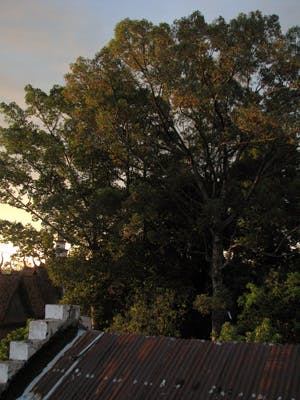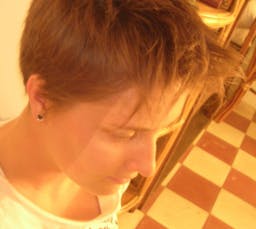Holding Hands
Jan 21, 2015
Story


I wrote this as a My Story submission, and then found out it was 1000 words too long. So, I will post it here instead.
A branch had fallen on someone’s car, someone who mattered, and the governor of Phnom Penh was outraged at the tree’s impertinence. To reassert his mastery over all things living, he ordered the tall trees in Phnom Penh to be cut down: hundred year old Cannonball Trees were felled outside the temples; Bhoddi Trees with trunks fat as elephants were taken apart until they were nothing but a stump wide enough for a family to sit on and eat their dinner. The sidewalks got hot; no one could walk along the riverside anymore for the dust and the sun.
The National Museum, an elegant historic building across the street from my house, dug in its heels and refused to chop the trees to the base. The foliage protected the wine coloured walls of the museum and offset the golden spires of the Royal Palace nearby. But the governor is not one to accept resistance and one by one they cut off the tops and the branches, leaving naked trunks and worn out wood siding exposed on the shrunken museum.
Every day, I make my way to a group of young adults that I train to be community leaders, yoga teachers and entrepreneurs. And each day, I pass by men with power saws and bandanas over their faces to get to the yoga center that is lush with foliage, fruit and birds. Children come to the studio from slums for weekly Kids Yoga classes and poke at the guppies that live in the fish ponds in the front yard after class. Teenagers from an organization that cares for young women rescued from human trafficking circles come for yoga therapy to reclaim ownership their bodies. These young people arrive at the studio for the first time bundled up in jackets and long trousers to protect themselves from the world, and after a few weeks can do backbends and shoulderstands, they are stretching out their arms and legs without feeling endangered, and they are confident and beautiful in sleeveless shirts and shorts. 250 kids come to yoga every week to reclaim their right to grow.
I train a group of young adults, aged 17-28, to teach these classes. To open space for others to grow, first they have to manage their own pain and fears; and as an optimistic young yoga teacher myself, I was sure that yoga could help them build their capacity to open to their darknesses and let these pains out of their bodies and minds. As a team, we spent as much time talking about mental and spiritual healing as we did practicing physical postures and breathing, and one day a door opened for Rattana, 19 years old, and she told me about being raped by her cousin when she was nine. She pulled her knees up to her chest and wrapped her arms around her legs and told me that when she was fourteen she was sick to death of seeing her family miserable with poverty, and she felt sorry for her mother who always tried to make it work and never made it work. She went to a brothel to borrow some money to help the family, and established terms of repayment, and every time she got close to paying off her debt they told her she owed more.
Rattana’s voice went from soft to loud, and her eyes were tearing but she kept speaking, increasingly oblivious to the people around her—myself and two other girls she lives with at Transitions Global—and I was beginning to understand why it was so hard for her to speak gently to others or touch the kids with kindness when giving adjustments. She talked with increasing rapidity as if to get it all out; she talked of gang rape, when two young men hired her for the night and then took her to a cemetery where eight of their friends were waiting. I understood where the cigarette burns on her thighs came from. She said the police raided the brothel when she was sixteen years old and they threw her in jail with criminals and they beat her for being a broken girl and then she was picked out by an NGO and sent to live with other girls who reminded her of herself: miserable, angry and used up. She leaned her head on her arms; the other girls in the room with comparable stories had blank faces, one clutched at her temples and said she had a headache. Then Rattana looked up and said she had a new life now, it was like one book was closed and a new one was open and everything was changed. She had a new family at Transitions, she had a job, she had respect, she was a new person now.
I spent the rest of the week in a daze of information delivered to me first-hand from a kid I know and love. I handled it like they do: I tried to put it away, there was nothing else to do about the images I now had in my head, and they interfered with the work that I had to do, and I could not afford to let my own confusion and weakness show to these young people who trusted me to lead them somewhere safe. I made it through the week and on my day off I laid out my yoga mat at home, and stretched and cried.
While I was on the mat, the chainsaws across the street started up again; they had been silent all week. They had pruned all the lesser trees back to their trunks and that morning they started on the biggest one with the squirrels and helicopter pods that would fly in through my writing room window. I had been telling myself that they would not be cutting that one; surely the beauty of that particular tree was too much even for them to miss; surely someone would take note at some point of the value of life in this city of poverty , barbed wire, rust and wretchedness. The bandana-faced men went up in machines and spent the greater part of the day sawing off branches thicker than my body and letting them crash to the earth. There were no birds anymore, the sky looked naked and raw, and every time they put their saws into wood I heard the screech and groan that is the negation of life, the destruction of innocence that comes not from hatred but from blindness. Every branch they cut was to my ringing ears the sound of boys in this country raping my girls, unable to see life in the bodies they push down, unable to see the beauty in their faces. Humanity without sensitivity to beauty, beings without the ability to cherish life, are machines; cold, growling, insensible power tools that let colour and life crash to the ground.
My girlfriend came over to my house that day and held my hand. I told her what I heard outside my window, behind the curtains pulled across in futile attempt to stop the growing exposure of empty sky. She held my hand and I cried. She didn’t say anything to try and make me feel better, because there is no feeling better when you see human beings erasing life from this planet, draining it out of nature and from other human beings. She held my hand and she sat with me and she shared with me her love. And that is all I can do for my girls, too; I cannot heal them, I cannot cleanse their minds and bodies of the knowledge they have incurred by being born girls into a poor society. I can hold their hands, though, and share with them my love, and I can believe that like the trees outside my window, these girls will grow their leaves back and over time, a long time, a lifetime, they will grow new branches and they will fill the sky.




